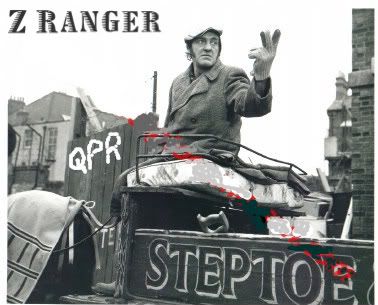Post by QPR Report on Sept 22, 2009 7:06:52 GMT
Quite a study 
The Guardian
• Guardian study shows added time to turn round home games• Owen won derby after an extra five minutes and 26 seconds
Daniel Taylor The Guardian, Tuesday 22 September 2009
Sir Alex Ferguson likes to boast that his Manchester United team score more late goals than any other side in the world. Others argue that they get a bit of extra help from referees. It has now emerged that the Premier League champions do, as suspected, benefit from an imbalance in the amount of stoppage time that is added to their matches.
After the controversy over Michael Owen's winning goal in Sunday's Manchester derby, the Guardian has looked at all of United's league matches at Old Trafford since the start of the 2006-07 season and discovered that, on average, there has been over a minute extra added by referees when United do not have the lead after 90 minutes, compared to when they are in front. In 48 games when United were ahead, the average amount of stoppage time was 191.35 seconds. In 12 matches when United were drawing or losing there was an average of 257.17sec.
The average stoppage time added at Old Trafford in the period in question is below that given at Anfield, the Emirates Stadium and Stamford Bridge. United's is 205 seconds, compared to Liverpool's 210sec, Arsenal's 224sec and Chelsea's 229sec. But there is also evidence to support the suspicions of many managers, players and supporters that United get preferential treatment at home. When Owen made it 4-3 on Sunday the game was five minutes and 26 seconds into stoppage time. In total, the referee, Martin Atkinson, allowed almost seven minutes, even though the fourth official had signalled a minimum of four. Mark Hughes, the City manager, spoke of feeling "robbed". His sense of grievance will not be helped if he analyses the last three seasons.
In 2006-07, for example, United were winning 15 times on entering stoppage time and referees added an average 194.53sec. In the four games when United were not winning there was an average of 217.25sec. The following year the disparity was greater, Opta's figures showing an average 178.29sec added when United were winning and 254.5sec when they were not. Last season it was 187.71sec compared to 258.6sec.
The pattern has continued in the first three games of the season. In the two games United have led they have played an average 304sec of injury time. On Sunday, Atkinson allowed the game to go on for 415sec.
www.guardian.co.uk/football/2009/sep/22/manchester-united-goals-stoppage-time

The Guardian
• Guardian study shows added time to turn round home games• Owen won derby after an extra five minutes and 26 seconds
Daniel Taylor The Guardian, Tuesday 22 September 2009
Sir Alex Ferguson likes to boast that his Manchester United team score more late goals than any other side in the world. Others argue that they get a bit of extra help from referees. It has now emerged that the Premier League champions do, as suspected, benefit from an imbalance in the amount of stoppage time that is added to their matches.
After the controversy over Michael Owen's winning goal in Sunday's Manchester derby, the Guardian has looked at all of United's league matches at Old Trafford since the start of the 2006-07 season and discovered that, on average, there has been over a minute extra added by referees when United do not have the lead after 90 minutes, compared to when they are in front. In 48 games when United were ahead, the average amount of stoppage time was 191.35 seconds. In 12 matches when United were drawing or losing there was an average of 257.17sec.
The average stoppage time added at Old Trafford in the period in question is below that given at Anfield, the Emirates Stadium and Stamford Bridge. United's is 205 seconds, compared to Liverpool's 210sec, Arsenal's 224sec and Chelsea's 229sec. But there is also evidence to support the suspicions of many managers, players and supporters that United get preferential treatment at home. When Owen made it 4-3 on Sunday the game was five minutes and 26 seconds into stoppage time. In total, the referee, Martin Atkinson, allowed almost seven minutes, even though the fourth official had signalled a minimum of four. Mark Hughes, the City manager, spoke of feeling "robbed". His sense of grievance will not be helped if he analyses the last three seasons.
In 2006-07, for example, United were winning 15 times on entering stoppage time and referees added an average 194.53sec. In the four games when United were not winning there was an average of 217.25sec. The following year the disparity was greater, Opta's figures showing an average 178.29sec added when United were winning and 254.5sec when they were not. Last season it was 187.71sec compared to 258.6sec.
The pattern has continued in the first three games of the season. In the two games United have led they have played an average 304sec of injury time. On Sunday, Atkinson allowed the game to go on for 415sec.
www.guardian.co.uk/football/2009/sep/22/manchester-united-goals-stoppage-time






